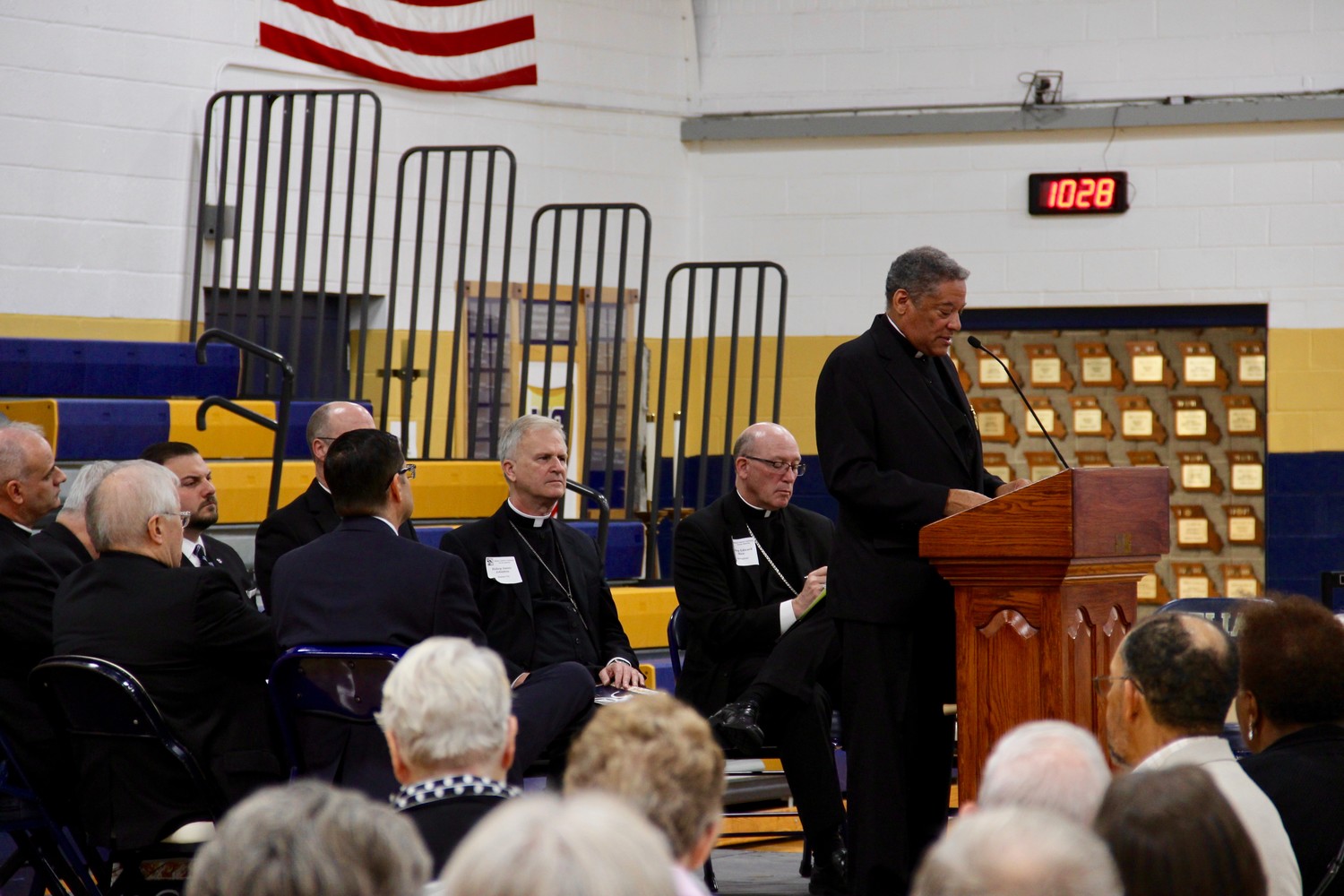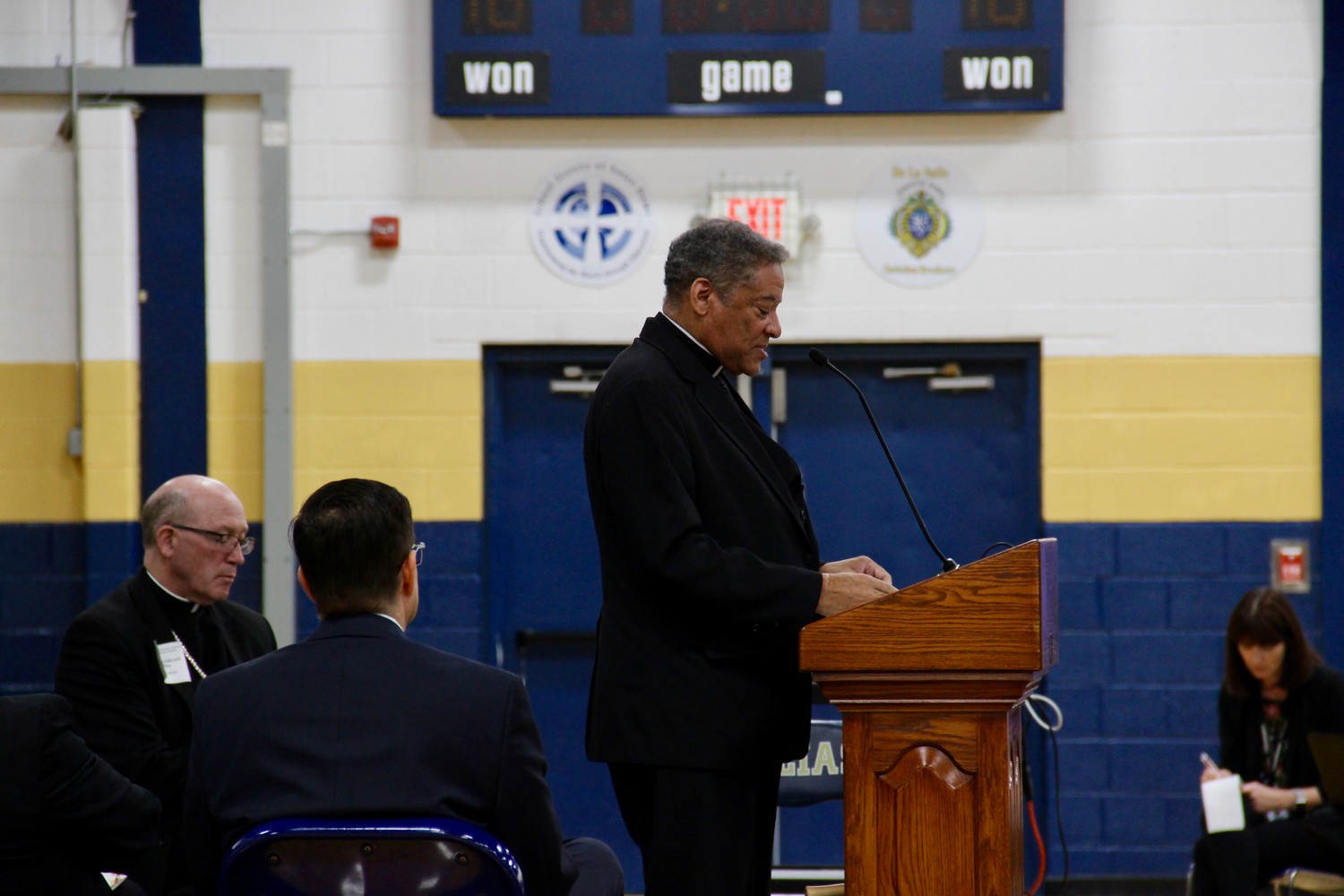‘Francis at five’ — A shepherd’s call to minister on the margins

“This Pope is not afraid to get his hands dirty, walk the dirty streets of our towns and cities or get the hem of his white cassock soiled or his shoes scruffy.”
Bishop Joseph N. Perry offered astute witness to how the Church and the papacy have changed and are still changing in the five and a half years since Pope Francis ascended to the papacy.
Calling to mind the words of German commentator Christoph Strack, he said: “No matter how many years Francis continues to lead the Church, he will leave it both inspired and devastated when he goes.”
“In the end, we will appreciate him imitating the Jesus we know ... the Christ Whose compassion was always remarkably evident, Whose invitation was always there to follow Him,” stated Bishop Perry, auxiliary bishop of Chicago, keynote speaker at the 2018 Missouri Catholic Conference Annual Assembly in Jefferson City.
The theme for the Oct. 6 event was “Five Years of Pope Francis: The Church at the Peripheries.”
About 400 people attended.
“First with our hands”
Bishop Perry is co-postulator of the sainthood cause of Servant of God Father Augustus Tolton (1854-97). A Missouri native and former slave, Fr. Tolton overcame tremendous obstacles in order to become the Roman Catholic Church’s first black priest in the United States.
Bishop Perry, himself a descendant of African slaves, who still occasionally encounters racial bias when he’s not wearing clerics, likened Pope Francis to a modern version of St. Peter Claver.
That 17th-century Jesuit priest and his helpers met incoming slave ships arriving in what is now Colombia, baptizing and ministering to the human cargo who had made the Atlantic Crossing in chains and stomach-churning squalor, on the way to a life of brutality and forced labor “in what we claimed was the land of the free.”
“Peter Claver trained his helpers with the words, ‘We must speak to them first with our hands before we speak to them with our lips,’” said Bishop Perry.
Francis, he asserted, is like Peter Claver in that “he does things that nobody else would do and helps a people nobody is inclined to.”
The Pope identifies with people who are “street poor,” referring to them as children of God and brothers and sisters of Christ.
“Whatever your feelings or thoughts are about the person of the Pope, this feature of outreach of the Bergoglio papacy will probably remain his enduring legacy,” he stated.
“Attractive narratives”
Bishop Perry noted that as one drawn toward simplicity and one-on-one interaction, Pope Francis has found admiration, even popularity, among Catholics and non-Catholics alike.
“Certainly, he highlights many of the attractive narratives of the Christ in the Gospel — not only the hard sayings, but the Lord’s sense of understanding and forbearance and indiscriminate regard for every man and every woman and child,” he said.
In his approach to addressing all of today’s hot-button issues, the Pope summons the world to deeper solidarity and an intentional, personal encounter with the people most thoroughly relegated to society’s margins.
From the beginning, Francis has been articulating his vision for “a poor Church, of the poor and for the poor,” insisting that “we will have to answer to God for how we treated the poor, for it was the poor who were open to hearing the Gospel of the poor Jesus.”
Joyful and consistent
Throughout his talk, Bishop Perry made frequent reference to Christ’s horrific death and wholly unimaginable resurrection.
While most people would prefer a comfortable Church, he noted, “this Pope is comfortable with discomfort, with struggle in the arena of life even with those who pose themselves as enemies of the Gospel, the lukewarm of Christian faith, and outright sinners.”
In fact, Francis is eager to remind the faithful that by continually embracing the experiences of the poor, the Church will always remember her own dependency on Jesus.
Poverty, Francis insists, is at the center of the Gospel.
“Jesus was attentive to the marginalized, so we are attentive to the marginalized,” said Bishop Perry.
He said it’s no coincidence that many of the issues currently under intense debate in statehouses and courtrooms across the country are also concerns of the Holy Father.
“The role of the Catholic Church is similar to any other religious group, especially who shares our values for life, religious liberty and wellbeing and equality and justice,” Bishop Perry stated.
The Church projects its voice in ways that transcend partisan concerns and political whims. While advocating for the common good, the bishop asserted, people of faith must live with integrity, “showing upright lives representative of the same values we expect our leaders to champion for us.”
“If we want to call ourselves pro-life on abortion, then we have to oppose the dehumanization of migrants,” he stated. “If we criticize the devaluation of life by euthanasia or physician-assisted suicide, then we must criticize the devaluation of life by racism.
“If we want to be regarded as pro-family, then we have to support access to healthcare. We must continue to press for belief and practice of the intrinsic and equal value of all human lives.”
The Pope, as spiritual father to all the world’s Catholics, carries the burden of affirming what is good in the lives of the faithful while always encouraging people to do and become more.
Bishop Perry pointed to Pope Francis’ work toward making the Church less bureaucratic, “with a mission to be in the streets beside the homeless, the unwashed and those considered strangers, those trapped on the underside of life.”
The Pope has also summoned all Catholics to an intentional encounter with people on the existential margins: those who are unaffiliated, those who are baptized but fallen-away, those who are alienated.
Ministering to these growing segments of society on their own turf is what Pope St. John Paul called the “New Evangelization.”
Francis calls it “The Joy of the Gospel.”
Preference to the weakest
Bishop Perry reminded everyone that a Catholic worldview includes a commitment to bolstering the common good, “whereby justice in society is measured by the treatment of its weakest and most vulnerable members.”
He noted how easy it can be to let pious thoughts and prayers excuse the faithful from caring for the widows and orphans of this day.
“We know that concrete actions must follow upon the carefully worded general intercessions on Sunday,” he said.
Accordingly, the Pope is summoning the world to turn the tide against what he calls “the globalization of indifference” — a tendency not to care for people who are different or far away.
He issues an ongoing challenge to stand against the coarseness and partisan rigidity that characterize much of the political and social discourse in this country.
His own gifts and shortcomings on full display before the entire world, Pope Francis calls on all Catholic Christians to examine their individual, collective and historical failures, and work toward creating a semblance of the Kingdom on earth while waiting for Christ “to return and take us with Him.”
“This is the stuff for which Jesus Christ bled and died, to save this world for God,” said Bishop Perry.
Comments
Other items that may interest you
Services
The Catholic
Missourian
2207 W. Main St.
Jefferson City MO 65109-0914
(573) 635-9127
editor@diojeffcity.org







